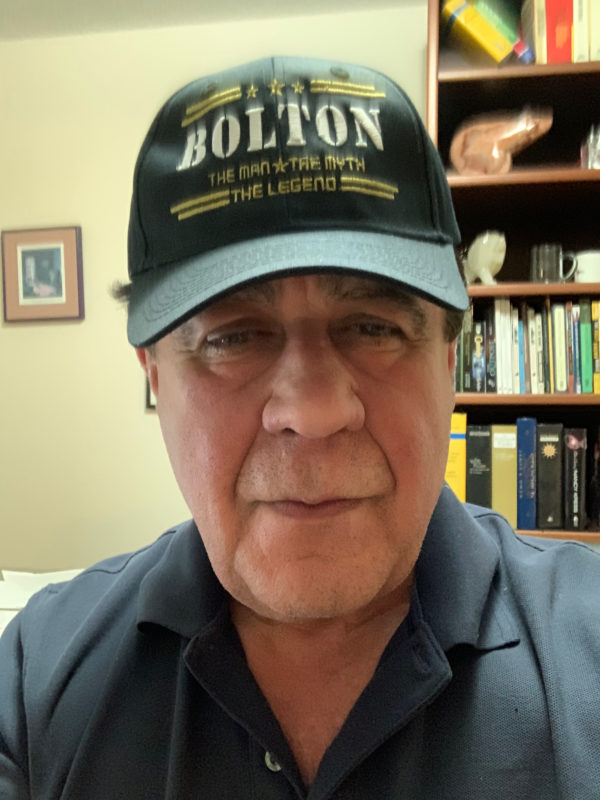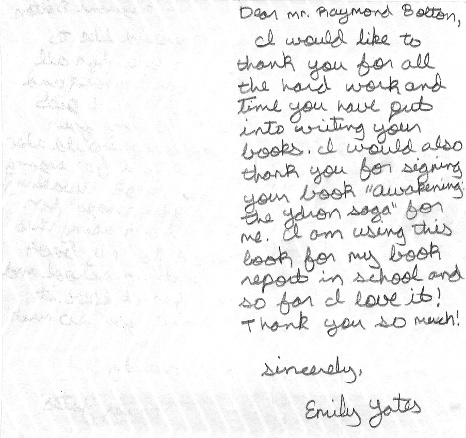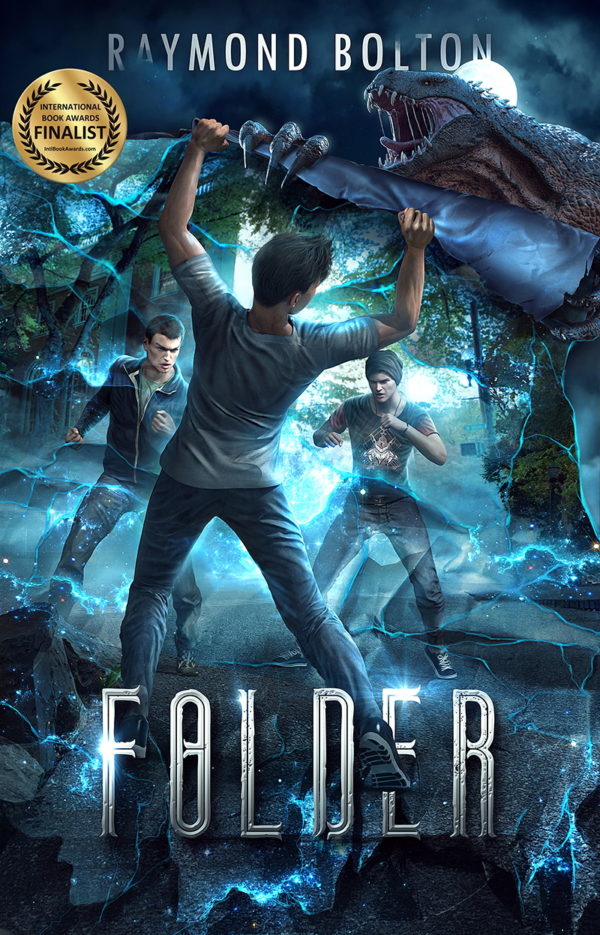
Welcome to my weekly Author Spotlight. I’ve asked a bunch of my author friends to answer a set of interview questions, and to share their latest work.
Raymond Bolton lives near Portland, Oregon with his wife, Toni, and their cats, Max and Arthur. He has written award-winning poetry and has published six novels.
His crossover epic fantasy/sci-fi quartet, The Ydron Saga, which consists of Awakening and its prequel trilogy, Thought Gazer, Foretellers and Triad, are published by WordFire Press, publisher of many bestselling and award-winning authors including Frank Herbert, Kevin J. Anderson, Jody Lynn Nye, Alan Dean Foster, Mike Resnick, Brian Herbert, Tracy Hickman, and David Farland, as well as the Dune and Star Wars series.
His work has been endorsed by the late Mike Resnick, who says, “In AWAKENING, Raymond Bolton presents us with an intricate and interesting problem, characters you care for, aliens who -are- alien, and a carefully-thought-out future.” International award-winning author of more than 100 books, Paul Kane, describes his work as, “Thoroughly imaginative, with an eloquent writing style and characters that live and breathe on the page.”
Thanks so much, Raymond, for joining me!
J. Scott Coatsworth: How would you describe your writing style/genre?
Raymond Bolton: I write speculative fiction, a genre that encompasses science fiction, fantasy, horror, and the paranormal.
JSC: What was your first published work? Tell me a little about it.
RB: My first published novel, entitled Awakening, is part of The Ydron Saga, an epic fantasy/sci-fi quartet. I originally released it as a self-published work, but it, along with the related three, has since been acquired by WordFire Press. It is the story of a medieval society on the cusp of an industrial revolution who are unexpectedly faced with an alien invasion of telepathic shapeshifters and a technology beyond their imagining.
JSC: Have you ever taken a trip to research a story? Tell me about it.
RB: Several years ago, I was working on a thriller set in New Mexico. I lived in Santa Fe at the time. Part of the story needed to be set in Farmington, near the four corners region for reasons integral to the plot. I’d never been there, so I drove to Farmington, spent part of the day there, then drove home by a different route. Another part of the story had to happen at a small, non-commercial airport just outside Albuquerque, so I drove there as well. Both trips helped me add degrees of realism to the book that couldn’t have happened otherwise.
JSC: What do you do when you get writer’s block?
RB: Any author who experiences it needs to know that writer’s block means one thing, and one thing only: you don’t understand your story well enough to move forward. I use a couple of techniques to get around that blockade:
1) I’ll make notes about what has happened so far and what needs to eventually happen. Then, I will identify what must logically follow from where I am now, to get me to what needs to occur later on, then arrange them in sequence. Once I’ve completed that process, I will start writing each of the steps (scenes/chapters) I’ve now identified.
2) If I have an idea for a scene that occurs later in the book, I’ll start working on it now, so when I need to insert that scene into the story, it will already have been written and I will have made up for some of the downtime.
JSC: Do you read your book reviews? How do you deal with bad or good ones?
RB: I read all of my reviews. Naturally, I love the four- and five-star reviews, but I also find some of the lesser reviews informative. Initially, reading them was difficult, but I eventually realized that not everybody loves every author. Some people HATE Stephen King, J. R. R. Tolkien, and Isaac Asimov. That doesn’t make them anything less. And while certain pejorative reviews are written by trolls who are trying to take down my rating—they typically have little or nothing to do with the book (one troll criticized my 109K epic fantasy for being “short”)—sometimes they simply reflect the preferences of the reading public (like the person who downgraded Folder for being a first person narration).
JSC: Are you a full-time or part-time writer? How does that affect your writing?
RB: Unfortunately, I still have a day job. That means I write whenever I make the time for it. Please note: I said MAKE the time, not FIND the time. I firmly believe that if a writer doesn’t make the time for his writing, it’s basically a hobby and it will never become a full-time job.
JSC: Are you a plotter or a pantser?
RB: I have to be a pantser. Whenever an idea for a new book comes to me, the opening scene typically comes first, along with a little bit more. Shortly after I begin writing, I decide what the ending will be. Everything else comes to me during the writing process. Sometimes it’s as if I am channeling a story that has already happened.
JSC: What is the most heartfelt thing a reader has said to you?
RB: This is a note I received from a reader:

JSC: How do you approach covers for your indie stories?
RB: A cover is crucial to the success of a book. It is one of the things that compels a prospective reader to pick of the book and open it. Consequently, I hire the best cover artists I can find because, if the cover is slipshod, the book will surely fail.
JSC: What are you working on now, and what’s coming out next? Tell us about it!
RB: I am writing what I hope will become an epic-length fantasy. It involves wizards, sorcerers, things that go bump in the night, and the end of days for mankind. Its working title is The Magi. Unfortunately, that is all I’ll reveal for the present.
And now for Raymond’s new book: Folder:
Eric Folder has moved to Oregon to attend Portland State University when an automobile accident leaves him stricken with migraine headaches. The resulting visual effects—something medical professionals term an aura—render him virtually blind and defenseless when a gang of street thugs attacks him. Desperate to see and needing to protect himself, Eric reflexively tears at the luminous lines of light and finds they have become tangible. When he pulls them aside, his present reality folds away with them, leaving him in better circumstances with his enemies vanished. Attempts to fold his way out of successive perils leave him in increasingly strange situations until, eventually, his world becomes a nightmare.
“A wild young-adult alternate-worlds adventure that will leave you guessing right up to the end! Fans of Philip Pullman’s His Dark Materials will love this!” —D. J. Butler, author of Witchy Eye
“A big, engaging ride across our infinite possibilities – and our choice to be heroes.” —Anthony Dobranski, author of The Demon in Business Class
Get It At Amazon | Universal Buy Link
Excerpt
I’m lost.
I don’t know if I should laugh or cry when I say this, because I sound as if I’m repeating words from a hymn or I’m in need of a compass, or else I’ve given up completely. The thing is, I’m terrified because all these things are true and I don’t know how to fix them. I would say a prayer if I thought someone could hear, but even if they did, I don’t think this is a place where prayers get answered. If I had a compass, knowing whether I’m facing North or South wouldn’t take me away from this place, let alone back to where I started. In fact, no one can get me out of the mess I’m in, except maybe me, and I’m as scared to try to change what has brought me here as I am afraid do nothing.
I remember when my friends and I were kids and we hid in the bushes and pretended there were monsters coming after us. Well, now the monsters are real. I’ve been listening for what seems an eternity to their angry snorts and the clatter and scratches of their claws on the large stone surface where those creatures are gathered. Every now and then, one of them hisses and another does the same in response. The rate of their footsteps escalates and I imagine two of them colliding and squaring off in an expression of indignation. It’s too dark to see whether this has actually happened, or if it’s just my imagination, but the pounding of my heart in face of the impending danger keeps me riveted on what’s happening.
As I hide in a clump of bushes and the minutes pass, I’m more than a little relieved that they’re taking so long to find me. Unexpectedly, the full moon peeks through a break in the cloud cover and the scales on the bodies of several great beasts glisten. Each is twice the size of a bullmastiff and I count six of them several yards from here. Their eyes glow whitish gold and appear to have vertical slits, although it’s hard to be sure at this distance. As they circle a spot where I was standing a short while ago, sniffing the ground in several directions around it, one of them raises its head and opens its mouth, baring rows of long, needlelike teeth. I expect the creature will howl. Instead, a rasping reptilian sound emerges and I shudder, wondering what kind of beings they are.
Although I’ve recently arrived, from my earlier experiences and the landscape’s layout, I recognize this place as being near where the street car used to stop in a time that’s lost to me forever. The place where I’m hiding used to be the parkway where Park crosses Mill—or what used to be Park and Mill before everything transformed into this new reality. There aren’t any streets anymore and I’m surprised there are even deer trails to mark where Park and Mill once intersected. This used to be Portland State University, but now everything’s grown over and forested. The clock tower has vanished, as have the student union and the rest of the buildings that were part of the campus.
Without warning, a thought bubbles up from a world I’ll never see again and I almost cry out loud. Cursing this lack of control, I force my idiot self to keep quiet. Still, there is some truth to the thought that this situation is what Dad would have called a mixed blessing. It’s because it rained so hard that those things haven’t discovered me already. Here I am, kneeling on a thick bed of leaves. If they weren’t so soggy, they would crackle each time I move and announce my location. Instead, their wetness muffles whatever noise I might otherwise make. On the other hand, because the night is so cold and water is starting to soak through my pants, I’m beginning to shiver and I’m afraid I might sneeze any minute. If I do, those creatures will certainly hear and I know I will die because I’m sure they can out-run me.
The breeze that’s been chilling me starts to increase and I wonder if another storm is building. The last of autumn’s leaves whip though the air and there is a sharp crack above me. The creatures turn in my direction and two cock their heads. A third one starts walking toward me and I hold my breath, wondering whether it will continue to advance, when a second crack drops a large bough into the bushes a few yards to my right. The creatures stop and stare at the spot where it landed. Then, apparently satisfied they understand what caused the disturbance, they resume their search in the original location. Realizing I’ve been holding my breath and that I need to breathe, I inhale deeply, then exhale. My breathing is starting to grow normal when something grabs my shoulder.

